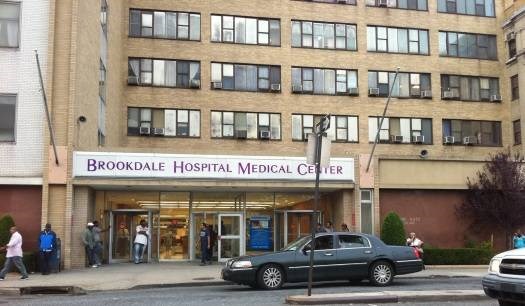One Brooklyn Health System's Brookdale University Hospital Medical Center recently was rated one of the top four hospitals in New York State.
The hospital located in the Brownsville/East New York area of Brooklyn was recognized (from 2014-2016 data) for providing patients some of the best cardiac treatment in the entire state.
"Brookdale serves a unique function, because if Brookdale were not here, there'd be a health dessert in this area," said Dr. Chadow, the director of the division of cardiology and director of the cardiac catheterization laboratory at Brookdale Hospital. "In this whole area, from the beginning of Linden Blvd all the way to the Jackie Robinson, there's nobody providing advance cardiac care; advance stroke care; trauma care... There's just us.
"So we really provide a full service to the community we serve and all of us are dedicated to the mission, which is to provide first-rate quality care to our patients in this part of Brooklyn."
Dr. Chadow credits the continuity and longevity of the staff to the department's success: The youngest person in the cardiac department has been with Brookdale for 10 years, and the oldest person, 50 years.
"The doctors who come here stay," said Dr. Chadow. "Why? Because they're able to advance in their practice, they love it."
Successfully meeting the needs of a predominantly poor and under-resourced community such as Brownsville/East New York has also been a part of what has made their department so astute and so skilled, he said.

"Working in this community can be challenging. These are usually very sick patients with co-morbid conditions, meaning they have a lot of illnesses that accompany their heart conditions," said Dr. Chadow. "But with great challenges come great rewards."
The department, which has eight full-time cardiologist and a few volunteer cardiologist, offers a full array of non-invasive, minimally invasive and non-surgical services, including consultations, stress testing, echo cardiograms, arrhythmia monitoring, cardiac ablations and catheterizations.
And of course there are the surgical surgeries including instilling pacemakers and open-heart surgery.
Not only is the department comprehensive in its services, the high proficiency and expertise of the staff enables them not only to treat virtually any patient with a life-threatening heart condition with efficiency and skill, but release the patient within 24 hours.
"Right before I met you for this interview," said Chadow, "a lady came in this morning with chest pain. We found one blockage put a stint in We're going to take out the tube in a few minutes; and by dinner time she'll be home with her family and back to her normal routine by tomorrow."
"Nobody gets to see really what goes on behind the scenes; all people see are the outcomes."
The Cath Lab Team consists of a tight-knit team of about 8-10 nurses dedicated nurses who have usually come from a critical area before and then go through rigorous training in the cath lab; and four full-time interventional cardiologist who have done advance training in cardio-catherization and who are on-call 24/7 to evaluate blockages and treat them through androplasty; as well as technicians and nurses aids and fellows who all work together to treat the patients.
"One of the biggest challenges I see in this community when comes to heart health is high blood pressure and compliance: You have to take the medicine," Dr. Chadow said. "The problem is, heart disease is a disease you do not feel initially. But by the time you feel it, it's too late. I can't tell you how many times a day I tell patients: You have a disease, you don't feel anything, but you need to take this blood pressure medicine.
"Because if you don't, in 20, 30 years, you're going to have big problems, like stroke, intracerebral bleeds; your eyes will be affected; you're going to develop lung issues, heart failure, kidney failure, and if you don't believe me, come upstairs and look at the patients that didn't believe us 20 years ago when we told them to get their blood pressure under control."
Also, it's a patient population that struggles to make ends meet, so sometimes, a lack of long-term ongoing and regular compliance is tied to a lack of finances.
He shared the top-three things people can do now to build their heart health and possibly avoid issues of high blood pressure and prolonged medication:
- "Start and maintain a healthy, low-fat diet."
- "Exercise! Just walking 20-30 minutes briskly, 4-5 times a week will do wonders for your heart health!"
- "Stop smoking, both cigarettes and K-2 (synthetic marijuana). Both cause heart attacks."
"Those three things would make an amazing dent," he said.
Still, for those who might need to address their immediate heart health needs, it's good to know that one of the best cardiac hospitals is in their own back yard. The report listed Brookdale with the lowest elective mortality in the state. And for emergency cases, it also held the lowest mortality rate in the entire state.
"Nobody gets to see really what goes on behind the scenes; all people see are the outcomes." said Dr. Chadow. "I mean that's what you're coming here for, right? Great outcomes.
"Our message to the community is, 'We're here. We've been here.'"
And the beat goes on...



